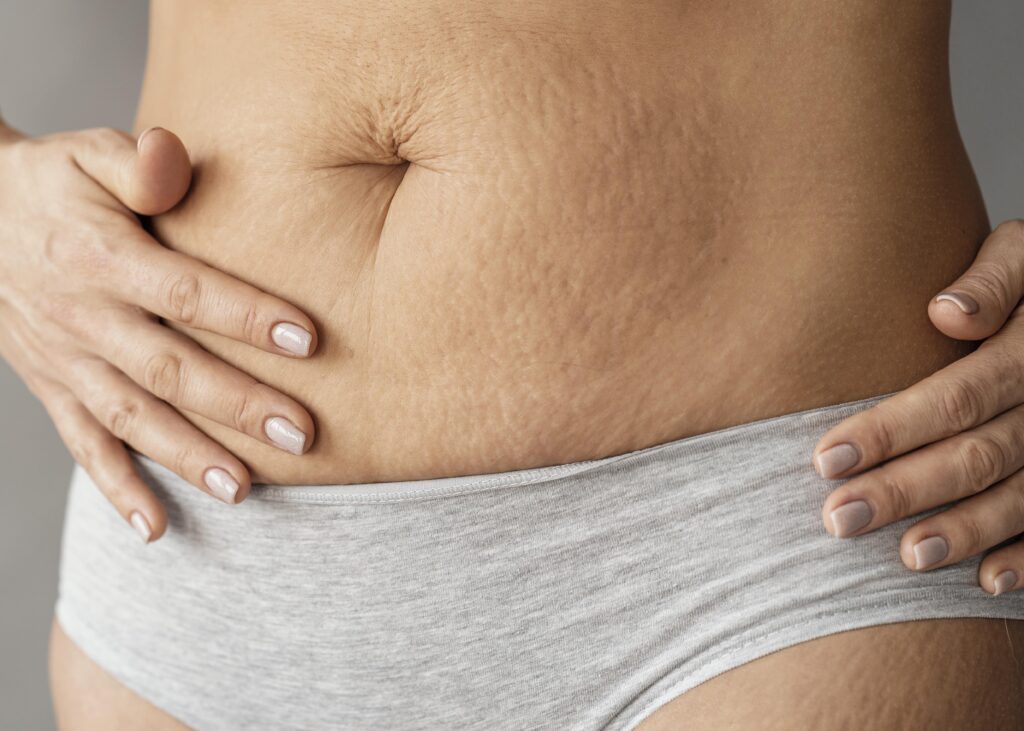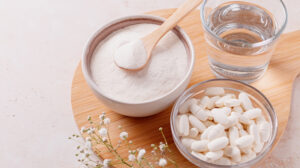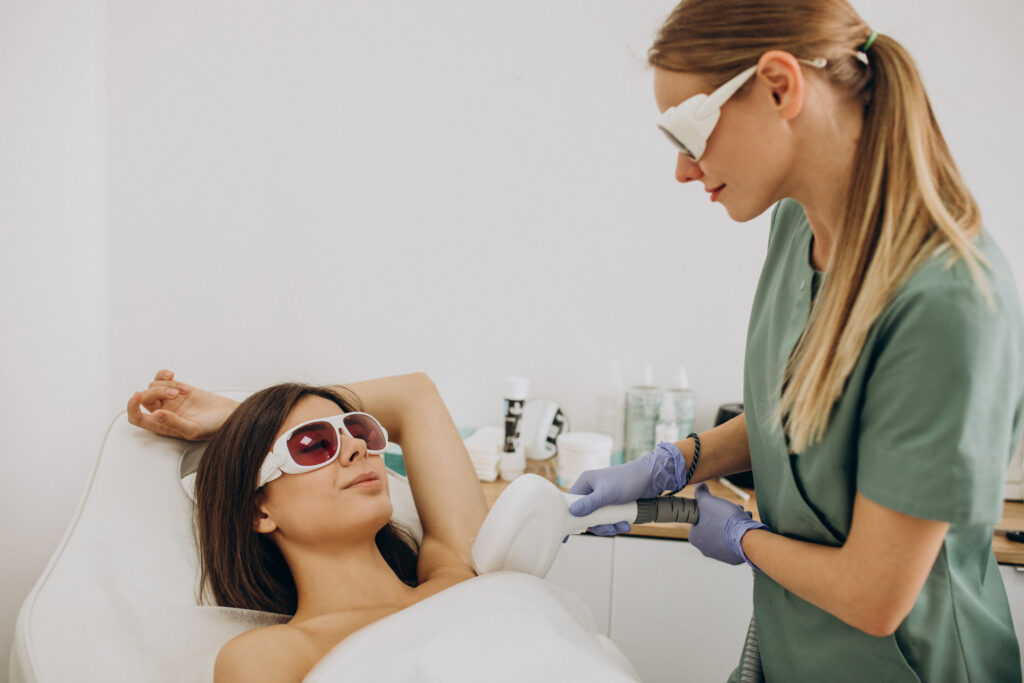
The skin always plays a key role in being an outstanding beauty. Anything that appears on or happens to your skin is a significant concern for you. Stretch marks can look ugly or make people self-conscious about their appearance. For people seeking various remedies to minimize or prevent stretch marks, collagen has emerged as a popular ingredient in skincare products to deal with stretch marks. A question usually arises, how does collagen help with stretch marks?
This blog will discuss how collagen helps with stretch marks and the different sources for preventing and reducing stretch marks. We will explore the relationship between collagen and stretch marks, examining scientific evidence, skincare practices, and the effectiveness of collagen in managing skin imperfections. Before diving deep into the collagen-stretch marks connection, let us discuss the basics of collagen and stretch marks.
Understanding Stretch Marks:
Stretch marks, scientifically known as striae distensae, are the marks or fine lines on the skin when it stretches beyond its elastic capacity. These scars (stretch marks) occur when the skin is stretched too far or too quickly and collagen fibers beneath the surface of the skin tear. Research by Medscape shows that approximately 90% of pregnant women, 70% of adolescent females, and 40% of adolescent males deal with these stretch marks. These marks can happen during periods of rapid growth, such as:
- Puberty
- Pregnancy
- Weight gain
Other possible causes of stretch marks may include:
- Bodybuilding
- Hormone fluctuations
- Some rare underlying health conditions
- Prolonged or inappropriate use of corticosteroids
It causes the collagen and elastin in the skin to rupture, forming scar-like marks that can appear red, purple, or silver.
Collagen: The Building Block of Skin
Collagen is an essential part of the skin. It is a protein that plays a fundamental role in maintaining your skin’s structure, firmness, and elasticity. It is produced by fibroblasts, specialized cells in the skin’s layer dermis. Collagen is the most abundant protein in the human body (1/3 of the total body proteins), forming a network of fibers that provide strength and support to various body tissues, including skin. It works similarly to glue in your skin, joints, and connective tissues.
It occurs in over a dozen different types, and each type plays a crucial role in your body’s natural processes. These include:

- Healthy joint
- Skin elasticity
- Supporting healthy bones
- Improves backbone and knee health
Our bodies begin to slow down their natural collagen production along with age.
How Does Collagen Help With Stretch Marks?
Collagen is a powerful anti-aging tool that can help reduce or prevent the occurrence of stretch marks and improve the appearance of existing scars. It is a primary claim associated with collagen and stretch marks that boosting collagen levels in the skin can help prevent or reduce the appearance of stretch marks.
Skin stretching is typically caused by too much cortisol, a steroid hormone released by two adrenal glands present on the top of both your kidneys. Collagen helps to work against the impact of cortisol, which weakens the elastic fibers in your skin. Thus, the support provided by an adequate amount of collagen makes the skin more robust and elastic. Such a skin is less prone to developing stretch marks.
How Do You Boost Collagen Levels In the Skin?
We can use the following routes to enhance collagen levels in the skin:
- Using collagen-rich diet or supplements
- Collagen induction therapy (CIT))
- Other beauty tips to enhance Collagen levels of the skin
All these pathways can help reduce or prevent stretch marks. The selection of the appropriate route depends on individual characteristics or personal choice.
Collagen-Rich Diet:

Consuming a collagen-rich diet can encourage natural collagen production in the body. Your diet must be rich in amino acids found in beans, dairy products, fish, and chicken. Consuming foods with an effective source of vitamins is also another way to boost your collagen production. These may include leafy greens, citrus fruits, nuts, and whole grains that support collagen production through vitamin C, zinc, and Copper.
Collagen Supplements:

Our body produces less collagen with age, which can be compensated using collagen supplements. Collagen can also be easily digested through collagen powders and formulas. These provide the amino acids required for the natural production of collagen. However, it is advised that you choose a collagen drink made with hydrolyzed marine collagen. This type of collagen comprises small peptides that the body can easily absorb. Take a healthy dose of collagen regularly to keep your body healthy, strong, and supported.
Collagen Induction Therapy:
If a collagen-rich diet and supplements are unable to produce collagen in the body to prevent or reduce stretch marks, another method of treatment is given here:
“Collagen Induction Therapy (CIT), also known as micro-needling, dermarolling, or skin needling, is a cosmetic procedure. It involves repeatedly puncturing the skin with tiny, sterile needles creating small wounds in the skin to induce collagen production.”

It is a relatively painless process and causes the skin to produce more collagen. Along with collagen induction, CIT also makes the body produce elastin. Elastin is a protein in the body that makes the skin elastic. CIT makes skin look young again. This therapy is a good option for those unable to have a collagen-rich diet and supplements or those whose bodies cannot digest them properly to produce collagen.
Other Beauty Tips to Enhance Collagen Levels of The Skin:
Here are a few beauty tips that can help you deal with or prevent stretch marks:
- Using a High-Quality Moisturizer or Cream – A high-quality skin care product helps hydrate and nourish your skin to make it more elastic. For this, choose a moisturizer or cream that contains ingredients like hyaluronic acid, cocoa butter, vitamin E, shea butter, and aloe vera. To get better results, apply these products twice a day.
- Using a Retinoid Cream or Gel – Retinoids are vitamin A derivatives that help improve your skin’s appearance by stimulating collagen production. Always use it on your stretch marks; otherwise, it may irritate if applied to other areas.
- Using Exfoliating Scrubs or Body Brushes – These remedies help remove dead skin cells and promote new cell growth. Use exfoliating scrubs or body brushes gently on your skin, as aggressive scrubbing can cause further damage.
- Getting Regular Massages – Another way to get rid of stretch marks is through massages. Massages help to improve blood circulation and lymphatic drainage, which reduce the appearance of stretch marks or skin damage.
How to Prevent Stretch Marks?
Along with treating your skin with different methods to boost collagen, you can also prepare your skin to prevent this damage and stretch marks. To avoid these scars, you can follow these tips:
- Quit Smoking – Smoking can destroy both collagen and elastin in your skin and makes it less resilient to damage and stretch marks. So, it is advisable to quit smoking to prevent stretch marks and wrinkles.
- Wear Sunscreen – Sun rays break down collagen and elastin in the skin, which can cause skin damage and stretch marks. Sun rays can also cause blemishes and skin cancer. So, wearing sunscreen with suitable SPF is always a good idea.
- Eat a Healthier Diet – A healthier diet helps prevent your body from stretch marks. It infuses the entire body with amino acids, vitamins, minerals, and other components the body requires. Eating healthy food also reduces the chance of abrupt weight gain, eventually preventing stretch marks.
- Get Plenty of Sleep – The body does most of its repairing work during your sleep hours. So, get enough sleep to help your body prevent skin damage and keep your skin youthful.
- Use Skincare Products – Prefer skincare products rich in retinol or retinoids. These products are excellent in preventing stretch marks or skin damage. It is because, unlike collagen, retinoids penetrate the skin deeper and can help maintain its elasticity.
- Drink More Water – When dehydrated, your skin dries out and begins to sag. Drinking plenty of water helps keep your skin hydrated and prevents skin damage.
Picking Out the Right Collagen Supplement:
You can select the right collagen supplement that can help reduce your stretch marks or keep them away. To choose the suitable one, you must look out for these three ingredients in a collagen supplement:
- Hyaluronic Acid – It is an essential ingredient in multiple collagen supplements and increases moisture levels in the skin. Hyaluronic acid keeps stretch marks to a minimum (well-hydrated skin is less likely to break when stretched).
- Vitamin C – It stimulates collagen biosynthesis. Vitamin C and collagen pairing in a collagen supplement synergistically promotes collagen production in your skin.
- Hydrolyzed Collagen Peptides – In a supplement, collagen is present as hydrolyzed collagen peptides, produced by cleaving large collagen molecules into smaller peptides. These peptides are more accessible to absorb for the body and enhance the supplement’s effectiveness.
Final Thoughts:
Stretch marks can be a sign of disgrace for people who had been once proud of their beauty. Regarding something that can address your stretch marks, collagen has emerged as a popular ingredient in skincare products and supplements. Collagen helps get rid of stretch marks and prevents their occurrence. With growing age or due to some dieting issues, natural collagen production can be reduced or minimized. Be sure to use enough collagen through a collagen-rich diet, collagen supplements, treatment by CIT, or other beauty tips. Let collagen reduce your stretch marks, and enjoy your beauty!
How Does Collagen Help With Stretch Marks? 3 Ways To Boost Collagen (FAQ)
Stretch marks are those reddish or white streaks that appear on the skin due to rapid stretching. While they can’t be completely erased, collagen can play a significant role in improving their appearance. Let’s explore this connection and answer some common questions:
- What Exactly Are Stretch Marks?
Stretch marks occur when the dermis, the middle layer of your skin, experiences rapid stretching. This can happen during pregnancy, rapid weight gain or loss, growth spurts, or even bodybuilding. The rapid stretching tears the collagen and elastin fibers in the dermis, leading to the formation of stretch marks.
- How Does Collagen Help With Stretch Marks?
Collagen is the most abundant protein in your body, providing structure, strength, and elasticity to your skin. When stretch marks form, the dermis loses its elasticity and firmness due to damaged collagen fibers. Here’s where collagen comes in:
- Improved Skin Support: By promoting collagen production, you can strengthen the dermis, providing better support for the skin and potentially minimizing the appearance of stretch marks.
- Enhanced Elasticity: Increased collagen promotes elasticity, allowing the skin to stretch and contract more effectively, potentially reducing the risk of future stretch marks.
- Wound Healing: Collagen plays a crucial role in wound healing. While stretch marks aren’t “wounds,” promoting collagen production can help the skin repair itself and improve the overall texture of the area.
- Do Collagen Supplements Actually Work for Stretch Marks?
The research on collagen supplements specifically for stretch marks is ongoing. However, studies suggest that collagen peptides may improve overall skin health and elasticity. While they might not erase existing stretch marks, they could potentially help prevent new ones and improve the appearance of existing ones by promoting skin repair and elasticity.
- Are There Topical Collagen Creams That Work for Stretch Marks?
Topical collagen creams are another option. However, the effectiveness can be limited. Collagen molecules are quite large, and it’s challenging for them to penetrate deep enough layers of the skin to have a significant impact. Additionally, topical collagen can break down upon contact with the skin’s surface.
- What Are the Best Ways to Boost Collagen Production Naturally?
There are several ways to naturally promote collagen production and potentially improve the appearance of stretch marks:
- Balanced Diet: Consume foods rich in Vitamin C, proline, and glycine, the building blocks of collagen. Think citrus fruits, bell peppers, berries, leafy greens, fish, and bone broth.
- Healthy Lifestyle: Get enough sleep (7-8 hours a night) for optimal collagen production and manage stress through techniques like yoga or meditation.
- Microneedling: This minimally invasive procedure creates tiny controlled injuries in the skin, triggering the body’s natural healing response and collagen production.
- Can Exercise Help Reduce Stretch Marks?
While exercise won’t directly erase existing stretch marks, it can improve overall skin health and tone. Maintaining a healthy weight can also minimize the risk of future stretch marks.
- Is There Anything Else I Can Do to Minimize Stretch Marks?
Here are some additional tips:
- Moisturize Regularly: Keeping your skin well-hydrated with a fragrance-free moisturizer can help improve elasticity and potentially minimize the appearance of stretch marks.
- Stay Hydrated: Drinking plenty of water helps keep your skin plump and hydrated, which can improve its overall health and appearance.
- Sun Protection: Sun exposure can damage collagen and worsen the appearance of stretch marks. Wear sunscreen with SPF 30 or higher daily.
- When Should I See a Dermatologist About Stretch Marks?
If you’re concerned about the appearance of stretch marks or have severe itching or pain, consult a dermatologist. They can assess your specific situation and recommend the best course of treatment, such as laser therapy or microneedling.
- Can Stretch Marks Be Completely Removed?
Unfortunately, there’s no guaranteed way to completely erase stretch marks. However, through a combination of approaches like promoting collagen production, maintaining skin health, and potentially seeking professional treatments, you can significantly improve their appearance and texture.
- Should I Be Self-Conscious About Stretch Marks?
Stretch marks are a normal occurrence affecting many people. Focusing on overall skin health, self-care, and embracing your natural beauty are important. While minimizing their appearance is great, remember they don’t define you.


Pingback: Does Laser Hair Removal Help In Hyperpigmentation? A Comprehensive Guide - ForbesPoint